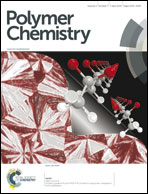Ring-opening metathesis polymerization of cyclooctene derivatives with chain transfer agents derived from glycerol carbonate†
Abstract
The synthesis of a variety of mono- and di-(glycerol carbonate) telechelic polyolefins has been achieved upon ruthenium-catalyzed ring-opening metathesis polymerization (ROMP) of cyclooctene (COE) derivatives in the presence of a vinyl or acryloyl derivative of glycerol carbonate (GC) acting as a chain-transfer agent (CTA). Reaction monitoring based on SEC and 1H NMR analyses suggested that the ROMP proceeds through the formation of first the α-GC,ω-vinyl-poly(cyclooctene) (PCOE) intermediate, which eventually evolves over time into the α,ω-di(GC)-PCOE. The nature of the solvent was shown to have a significant impact on both the reaction rates and the eventual selectivity for the mono-/di-telechelic PCOE. ROMP of 3-alkyl (methyl, ethyl, n-hexyl)-substituted COEs (3-R-COEs) afforded only the α-GC,ω-vinyl-poly(3-R-COE)s, as a result of the steric hindrance around the active intermediate, while a 5-ethyl substituted COE (5-Et-COE) enabled access to the corresponding α,ω-di(GC)-poly(5-Et-COE). The ROMP of 5,6-epoxy-, 5-hydroxy- and 5-oxo-functionalized COEs in the presence of acryloyl-GC as the CTA has also been achieved, affording from the first two monomers polymers with GC end-groups at both extremities, while a 60 : 40 mixture of mono- and di-GC terminated P(5-O![[double bond, length as m-dash]](https://www.rsc.org/images/entities/char_e001.gif) COE) was observed in the latter case.
COE) was observed in the latter case.


 Please wait while we load your content...
Please wait while we load your content...